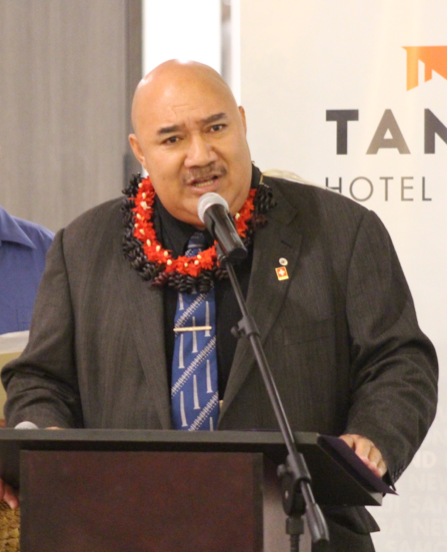Tonga’s health minister Dr Saia Piukala says people should learn to live with Covid-19 in the community as the first of the latest cases is deemed recovered.
Tonga recorded its first community cases on Tuesday after two frontline workers at the wharf tested positive for the virus.
Three more people, including two children, tested positive on Wednesday – all of them related to one of the earlier cases.
Tonga was still reeling from the catastrophic effects of the Hunga-Tonga-Hunga-Ha’apai volcanic eruption and tsunami on January 15, when the cases were discovered.
At a press conference on Thursday, Piukala said the active number of cases had dropped to four, as one had fully recovered.
Piukala said they had tested 389 suspected cases and all results had come back negative.
Health authorities were expecting more cases as locations of interest include a kindergarten, church, and three food and liquor outlets.
“Covid-19 is everywhere, and it’s here to stay,” Piukala said.
He added Tongans needed to learn to live with the virus, and the government had an advantage as it would look to how other countries were dealing with the pandemic to strengthen its approach.
It is still not known what variant of Covid-19 is on the island.
According to Kaniva Tonga news, Tonga Ministry of Health chief executive Dr Siale ‘Akau’ola said it was pleasing to see that the nation was prepared for an outbreak.
He said people could do their part by wearing face masks and following other Covid-19 safety guidelines.
Tonga has been in lockdown since Wednesday, and restrictions will be reviewed after five days.
Pacific health expert Dr Collin Tukuitonga, who is based in Auckland, said most Pacific islands, such as Tonga, had good uptake of the Covid-19 vaccine.
As of 16 January, more than 83 percent of Tonga’s eligible population was fully vaccinated – that was 64,047 people out of a total of 76,911 people over the age of 12 years.
At least 96 percent (73,938) of the eligible population had received their first dose.
Dr Tukuitonga said most Pacific nations were yet to start vaccinating the 5-11 year age group, and with Omicron, that was a huge concern.
“These measures are critical because Omicron is highly likely to spread further in these communities where housing and social conditions provide the environment for rapid spread of Omicron,” Dr Tukuitonga said.
“A large part of the spread relates to the high infectivity of the Omicron variant.”
He said while vaccination would dampen the spread in these nations, small and fragile health systems could be easily overwhelmed if the number of Omicron cases approached numbers seen in other nations.
“It is expected that half of the local population will be infected by Omicron,” he said.
Dr Tukuitonga said New Zealand and Australia had provided excellent support to the Pacific nations, but there was urgency now to provide support for boosters, vaccination for children 5-11 years and additional masks that were better at limiting the spread of Omicron.
Photo: Stuff NZ/ PACNEWS













